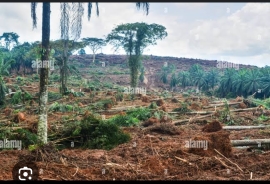
Environmental challenges facing Nigeria: Implications and potential solutions
By Bose Adelaja
CITIZENS COMPASS —Urbanization, deforestation, desertification, overpopulation and all kinds of pollution are some of the resultant effects of man’s interaction with his environment.
These changes occur as people attempt to acquire their seemingly endless desire for food, shelter, recreation and infrastructural facilities.
According to the United Nations, Nigeria has the highest rate of deforestation in the world, losing 3.7 per cent of its forest every year. It is also home to Africa’s largest mangrove forest, but only six per cent is protected.
Nigerian environment today is faced with many problems, arising from the impacts of human activities and natural phenomena. These include issues such as environmental pollution, sanitation, depletion of the ozone layer, desertification, flooding, erosion, poverty and bush burning.
Major areas of environmental challenges include:
Pollution from oil spills, gas flaring, industrial and agricultural effluents, sewage and solid wastes.
sustainable land use practices, reforestation, and stricter enforcement of anti-deforestation laws can help mitigate this problem.
Nigeria is plagued by severe air and water pollution due to industrial activities, poor waste management, and the use of dirty fuels for cooking and transportation.In terms of the country’s air quality, national reports show that air pollution continues to plague many Nigerian cities. Data indicates that the average annual level ( of particulate matter ( Pm2.5) in Nigeria is almost 10 times higher than the WHO recommended value.
What Are three environmental changes in Nigeria?
Rising sea levels, fluctuating rainfall, higher temperatures, flooding, droughts, desertification, land degradation, and an increase in the frequency of extreme weather events are all contributory factors to Nigeria’s changing climate.







